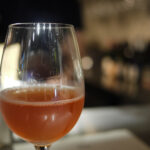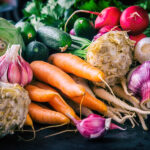 A growing population of health and environmentally-conscious individuals are concerned about what goes into their foods, such as chemicals, preservatives and genetically modified ingredients. Naturally this is spreading to winemaking.
A growing population of health and environmentally-conscious individuals are concerned about what goes into their foods, such as chemicals, preservatives and genetically modified ingredients. Naturally this is spreading to winemaking.
Natural or “minimal intervention” winemaking is nothing new. After all, wine has been made for centuries, well before agriculture went industrial and technology infiltrated our food chain. However, as conscious consumerism grows, more wine drinkers than ever are seeking out wines that mesh with their philosophy of “less is more.”
Several terms pop up in the wine jargon, including raw, natural, biodynamic, organic, vegan, as well as “contains sulfites,” but what do they mean? Here is a quick primer:
Let’s start with sulfites.
Small amounts sulfites (a.k.a., sulfur dioxide, a compound of sulfur and oxygen) occur naturally in fermented food and beverages, and wine begins as fermented grape juice. The difference is how much sulfite is in the wine. Many winemakers add sulfites to preserve and stabilize their wines. Since some people are sensitive to sulfites, U.S law requires wines with more than 10 parts per million of sulfites carry the label “contains sulfites.”
Organic wines

Natural winemakers may use clay amphorae to ferment and age their wines. Photo courtesy of Gravner, a natural wine producer in Friuli-Venezia-Giulia.
Wine labeled “certified organic” in the United States must abide by criteria established by the United States Department of Agriculture (USDA); no non-organic products may be used in any area of the winemaking process. The use of herbicides, fungicides, pesticides, synthetic fertilizers or other chemicals in the vineyards is forbidden, as is adding sulfites. Being organic does not necessarily mean a wine is natural or vegan. It still may contain other organic additives or animal byproducts.
Some vintners follow organic practices but choose not to apply for organic certification for their labels, citing the time and expense involved. Others feel having certification helps authenticate their wines which they feel is important for selling purposes. The organic regulation process varies by country.
Basile wines from Tuscany’s Maremma are 100% organic, and have been since 1999.
Vegan Wines
What do animal byproducts have to do with making wine? Animal manure may be in soil fertilizer, for example. Some winemakers use fish bladder (isinglass), egg whites, animal milk protein (casein) or boiled cow or pig parts (gelatin) to clarify their wines and eliminate unwanted sediments like dead yeast cells, protein particles and grape fragments. The process, called “fining,” produces a clearer liquid.
Vegan means no animal byproducts are used anywhere, but the wines can still be made with non-organic grapes and added sulfites, and filtered using vegan methods.
Natural Wines
Natural wines (a.k.a “raw wines”) are organically-farmed, using minimal technology or intervention. Nothing is added or removed to alter the wine. This means no GMO (genetically modified) grapes, chemicals (e.g. pesticides, herbicides, artificial fertilizers), mechanical harvesting, added yeasts, added sulfites or filtering. Europe’s Associazione VinNatur provides stringent standards for making natural wines followed by many producers around the world; however, there is no official certification for these wines in the U.S.A.
Minimal intervention wines still require some natural intervention. Green fertilization such as cover crops and natural composting are ways to protect the vines in the absence of pesticides.
Biodynamic

Resting wine bottles stacked on wooden racks in cellar
Biodynamic wines utilize the holistic, ethical and ecological teachings of scientist and philosopher Dr. Rudolph Steiner (1861–1925). Biodynamic farming works in harmony with the earth’s changing ecosystem. Planting, pruning and harvesting grapes revolve around a special biodynamic calendar that follows the lunar cycles. Biodynamic farming takes a homeopathic approach to nourishing the vines using special preparations of natural compost that include herbs and plants such as chamomile, yarrow and stinging nettle, manure and even cow horns.
Like natural wines, no chemicals or additives, such as commercial yeasts and sulfites are allowed. Biodynamically farmed wines must be inspected and certified by the international organization called Demeter.
So how do these wines taste?
Some natural and biodynamic wines have a distinctly funkier character; others may deliver a fresh intensity and deeper flavors. Like those first tastes of raw milk cheeses after eating pasteurized for most of your life, you feel their personality. Many ask if the lack of preservatives in natural wines affect their shelf life. Like all wines, they should be stored in a cool, dry area, and opened bottles should be consumed soon after opening and not left for days.
 Master of Wine Isabel Legeron, founder of RAW Wine, a global community of low-intervention organic, biodynamic and natural wines growers, and author of Natural Wines, writes, “Not all natural wines are produced for longevity. In fact, many so-called vins de soif are made as early-drinking thirst-quenchers However, there are many natural wines that are capable of aging well.”
Master of Wine Isabel Legeron, founder of RAW Wine, a global community of low-intervention organic, biodynamic and natural wines growers, and author of Natural Wines, writes, “Not all natural wines are produced for longevity. In fact, many so-called vins de soif are made as early-drinking thirst-quenchers However, there are many natural wines that are capable of aging well.”
Whether you want to try these wines because you follow a vegan diet, support the environment and animal welfare, have food sensitivities or allergies, or just don’t like the idea of chemicals or preservatives in anything you drink or eat, there are more selections- and growing- to choose from. Keep your mind open and your palate ready to experience another world of wine appreciation.
Here is a smattering of producers to check out. Ask your local retailer for suggestions.
Natural
Donkey and Goat (Anderson Valley, CA)
Gravner (and also biodynamic) (Friuli-Venezia-Giulia)
Pheasant’s Tears (Kakheti, Republic of Georgia
Biodynamic
Château de Beaucastel (Rhone)
Joseph Drouhin (Burgundy)
Vini Di Filippo Winery (Umbria)
Certified Organic
Tres Sabores (Napa)
Reyneke Organic (Stellenbosch, South Africa)
Tablas Creek (Paso Robles)- and biodynamic
Basile (Tuscany)
Vegan
Chateau Beausejour (Bordeaux)
Pizzolato Vineyards (Veneto)
Barnivore maintains an updated list of vegan friendly wines.
Resources:
RAW Wine Fair, open to trade and consumers, this global tour is a great way to get your lips wet tasting some of the world’s top natural wine producers.
The Feiring Line Natural Wine Newsletter: Journalist Alice Feiring is a passionate natural wine pundit and author of Naked Wine and other definitive books that zero in on the values of minimal intervention wine.
Vegan Wine Club. Members receive can attend special events and get discounts on vegan wines.
Melanie Young co-hosts the national weekly radio show, The Connected Table LIVE! Wednesdays 2 pm EST on W4CY Radio and podcast permanently to iHeart.com and the free iHeart App.
co-hosts the national weekly radio show, The Connected Table LIVE! Wednesdays 2 pm EST on W4CY Radio and podcast permanently to iHeart.com and the free iHeart App.



